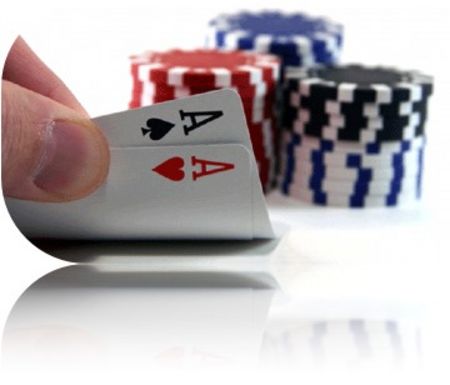High Pair

For purposes of this chapter, when there is a pair on the flop and you have two pair,
strategy is similar to having top pair or an overpair since everyone has at least one
pair. For example, you have AQ with a QTT flop or KJ with a QQJ flop. You always
need to worry about trips with a pair on the flop, especially when the pair is high. Of
course, this risk is dependent on how many players are in the hand and their
position.
Strategy often depends on whether or not you need to protect your pair. For
example, if the flop is T99 and you are holding T8, your hand is vulnerable to any
jack or higher falling. If you decide to play the hand, you usually should bet out
since you cannot afford to give a free card and you need to drive out your
opponents. On the other hand, if you hold AK with a flop of A99, your only major
worry is that an opponent holds a 9. The AK hand can be played more
conservatively since a free card is unlikely to hurt your hand.
Let's look at some of the betting strategies that can be employed with top pair or an
overpair when a high pair is flopped:
-
Checking and folding. Consider checking against several opponents when
you hold a weak kicker or a pair vulnerable to overcards to see what
develops behind you. You should generally fold when two or more players
call the flop or you call and a third opponent raises
- Calling or checking and calling. You can generally call with a strong kicker or
strong pair against a lone opponent when you are unsure whether or not
your opponent has trips.
- Check-raising. Check-raising against several opponents is risky. Many
players slowplay trips, so any other opponents who check behind you could
be holding a strong hand. You also risk giving a free card since many
opponents will not bet into a flop with a high pair. In general, avoid check-
raising if you do not want to risk giving a free card. If you are against a lone
opponent, check-raising can be effective to try and get your opponent to
bluff.
- Betting out. Generally bet out pairs that are vulnerable to overcards against
one or two opponents to avoid giving a free card. If you are raised or two
players enter the pot, you can then decide whether or not folding is correct.
One exception to betting out is when your hand is relatively weak against
several opponents (see Checking and folding).
- Raising the best hand. Consider raising with your strong pairs since most
players slowplay trips and their bet probably indicates a weak hand or a bluff.
This is especially true if the bettor is betting into only one or two opponents.
Internet Tip
Most weak opponents on the Internet tend to always slowplay trips, whereas in a live game players
tend to bet out more. This is in line with the general rule that Internet players play more deceptively
than live players do. Of course, this is a generalization and there are exceptions, but you can
generally assume that an unknown player will not bet out trips, especially if he is a weak player, In
these cases, you can safely raise if you have either an overpair or a good kicker card.
If you believe your opponent is bluffing and your pair is not vulnerable to overcards,
you might just call his bets down to the river rather than drive him out of the hand.
Against strong opponents, it is sometimes difficult to know their holding. Some
strong opponents will always bet out their trips while others always slowplay. With
your regular opponents, keep notes on their play and see if you can pick up some
of their tendencies on how they play certain types of flops.
Raising to try for a free card. When you are unsure if you have the best hand and
your pair is relatively strong, you could try a raise and then check the turn. In this
case you are minimizing your losses when your opponent has trips, while allowing
you to play out the hand and win the pot when you have the best hand.
Let's look at an advanced concept that many players do not consider. Sometimes
you might check and call even though you feel your opponent probably has trips.
Let's assume you think there is a 70% chance that your opponent holds trips. You
might play your hand if there is a large pot and your hand would win the 30% of the
time your opponent doesn't have trips.
Advanced Concept: Sometimes it is correct to check and call to the river even though you feel your
opponent probably has flopped trips. This becomes correct in a large pot when the pot odds are
enough to call in the small probability that your opponent doesn't hold trips combined with the
probability that you could improve to the best hand.
NEXT...Low Pair

